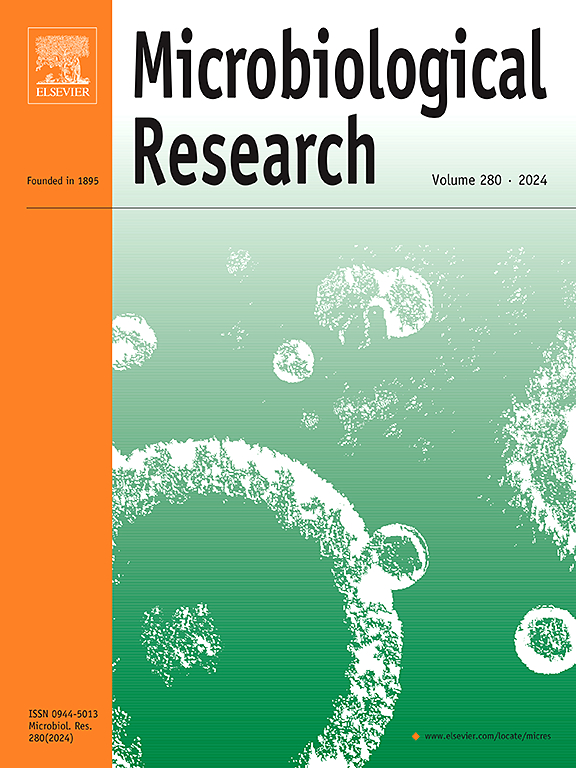Porphyromonas gingivalis outer membrane vesicles promote oral tumorigenesis through suppressing innate immune surveillance
IF 6.9
1区 生物学
Q1 MICROBIOLOGY
引用次数: 0
Abstract
Several studies have linked microbes to the development of neoplasms, with species of the genus Porphyromonas being closely associated with the progression of oral squamous cell carcinoma (OSCC). However, the immunomodulatory role of Porphyromonas gingivalis (P. gingivalis) outer membrane vesicles (OMVs) in OSCC progression remains unclear. Here, we found that Porphyromonas was significantly enriched in head and neck squamous cell carcinoma, including OSCC tissues. The increased abundance of P. gingivalis in OSCC was confirmed in both saliva and tumor tissues, and correlated with advanced clinical stages. The uptake of P. gingivalis OMVs by OSCC cells was assessed using both in vitro and in vivo models. The OMVs inactivated the cyclic GMP–AMP synthase (cGAS)–stimulator of interferon genes (STING) innate immune signaling, thereby disrupting cytokine production. Herring testis DNA treatment partially restored pIRF3 translocation and induce IFN-β production in vivo. Mechanistically, P. gingivalis OMVs remarkably disrupted both the IRF3–STING and IRF3–TBK1 interaction, consequently blocking the downstream signaling. In both immunodeficient (BALB/c-nu) and immunocompetent (C57BL/6) mouse models, P. gingivalis OMVs suppressed cGAS-STING innate immune signaling, impairing IFN-β production and promoting immune evasion by limiting the recruitment of natural killing cell and dendritic cell to the tumor microenvironment. These findings suggest that P. gingivalis OMVs suppress cGAS–STING–IFN-β innate immune signaling, thereby impairing antitumor immunity.
牙龈卟啉单胞菌外膜囊泡通过抑制先天免疫监视促进口腔肿瘤发生
一些研究已经将微生物与肿瘤的发展联系起来,卟啉单胞菌属的物种与口腔鳞状细胞癌(OSCC)的进展密切相关。然而,牙龈卟啉单胞菌(P. gingivalis)外膜囊泡(OMVs)在OSCC进展中的免疫调节作用尚不清楚。在这里,我们发现卟啉单胞菌在包括OSCC组织在内的头颈部鳞状细胞癌中显著富集。唾液和肿瘤组织均证实龈假单胞菌在OSCC中丰度升高,且与临床分期相关。通过体外和体内模型评估OSCC细胞对牙龈假单胞菌omv的摄取。omv灭活了环GMP-AMP合成酶(cGAS) -干扰素基因(STING)先天免疫信号刺激因子,从而破坏了细胞因子的产生。鲱鱼睾丸DNA处理部分恢复了pIRF3易位并诱导体内IFN-β的产生。在机制上,牙龈假单胞菌omv显著破坏IRF3-STING和IRF3-TBK1相互作用,从而阻断下游信号传导。在免疫缺陷(BALB/c-nu)和免疫正常(C57BL/6)小鼠模型中,P. gingivalis OMVs抑制cGAS-STING先天免疫信号,通过限制自然杀伤细胞和树突状细胞向肿瘤微环境的募集,损害IFN-β的产生并促进免疫逃避。这些发现表明,牙龈假单胞菌omv抑制cGAS-STING-IFN -β先天免疫信号,从而损害抗肿瘤免疫。
本文章由计算机程序翻译,如有差异,请以英文原文为准。
求助全文
约1分钟内获得全文
求助全文
来源期刊

Microbiological research
生物-微生物学
CiteScore
10.90
自引率
6.00%
发文量
249
审稿时长
29 days
期刊介绍:
Microbiological Research is devoted to publishing reports on prokaryotic and eukaryotic microorganisms such as yeasts, fungi, bacteria, archaea, and protozoa. Research on interactions between pathogenic microorganisms and their environment or hosts are also covered.
 求助内容:
求助内容: 应助结果提醒方式:
应助结果提醒方式:


